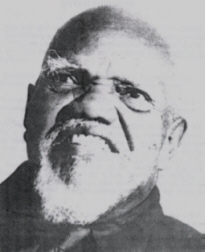

Tubal Uriah Buzz Butler (1895-1977)
Labor leader and politician.
He was born in Grenada and as a young man he enlisted for the front during World War I. After the war was over, he returned to Grenada for a while, then in January, 1921 he moved to Trinidad. Uriah Butler became a strong supporter of the pro-worker efforts then being made by the former captain of the British West India Regiment, Arthur Andrew Cipriani and joined the La Brea branch of Captain Cipriani's Trinidad Labour Party. But he became increasingly dissatisfied with what he regarded as Cipriani's "gentle" approach, and living as he did in the oilbelt at Fyzabad, he began serious agitation for the rights of oil workers.
His confrontation with oil employers grew until in 1935 he led a hunger march at Apex oilfields, Fyzabad, aimed at getting better conditions for the oilfield workers. Now, having frequent disagreements with Captain Cipriani, whom he accused of "somersaulting and back pedaling," he resigned from the Trinidad Labour Party. This was in July 1936, and in that same month he formed the British Empire Workers' and Citizens' Home Rule Party.
His agitation became more and more militant, and in May 1937, because of the alleged contents of a speech he had made to workers at Fyzabad, he was arrested and charged with inciting to riot and with sedition. He was summoned for June 14 but failed to appear, and a few days later, June 19, 1937, police tried to arrest him while he was making a speech to workers at Fyzabad, his followers resisted his arrest, and bloody riots broke out.
A police inspector was fatally shot, and a corporal was burned to death. What followed those riot known as the Butler Riots, or Oilfeild Riots, was widespread social unrest, especially in the oil areas. Butler, who was sought frantically by the police, went into hiding after the turmoil but gave himself up on September 9th, 1937. His trial lasted from November 25 to December 16. He was freed of the charge of sedition but was jailed for two years with hard labor on the charge of inciting to riot.
He served his sentence, but when world war II broke out in September 1939, he was re-arrested and detained as a security risk under the Defense Regulations. He spent six years in detention on Nelson Island, not being released until the war was over in 1945. Still enjoying extraordinary popular support and public sympathy at the time of his release, he thereafter went into active politics.
There was high hopes for him at the first adult franchise elections of 1946, but Butler was distracted by a Port-of-Spain, politician, Albert Gomes, who had criticized him. Thus, instead of contesting a seat in the oil belt where he had become a legendary figure, Butler attempted to "teach Albert Gomes a lesson" by challenging Gomes for the seat of Port-of-Spain North. In that constituency, essential Belmont, Gomes was an extremely popular figure, and the result was a humiliating defeat for Butler.
Toward the end of 1946, there was a flare-up of industrial unrest in the country, and this unrest was attributed to butler. The unrest reached crisis proportions when on January 22, 1947, followers of Butler who had crowded into Port-of-Spain, stormed the Red House. Port-of-Spain dock workers as well as public service worker were on strike, while in the oilfields the situation was critical, with rioting on the streets of Fyzabad and Point Fortin. The Carnival, which was scheduled to take place on February 17 & 18, barely escaped being banned. Butler continued his industrial agitation and did not turn away from the political fray.
He formed the Butler party and at the general elections of 1950, he of course fought in the oil belt and duly won the seat to represent St. Patrick West in the Legislative Council. His party won six seats, against two each by the other three parties, and there were six Independents. He retained his seat at the following general elections in 1956 but suffer another crushing electoral defeat in the general elections of 1961, fighting for the seat of La Brea, for by that time the aura he gained by his agitation for the workers in 1937 had worn off.
However, when the country gained independence in 1962, Butler's contribution as a labor leader, and his reputation as a fighter for the masses took on special significance. He was regarded as a hero of the people, and in fact, he was seen as the man who struck the first damaging blow against colonialism, thus giving courage to the fighters for independence.
In recognition of this, Butler was in 1970 decorated with the country's highest award, the Trinity Cross. But the greatest tribute of all came in 1973, when the anniversary of the oilfield riots, June 19, was declared an annual national holiday and celebrated as Labour Day. Butler died on February 20, 1977. The former Princess Margaret Highway has since been renamed in his honor.
¤ The Emergence Of Butler
¤ Butler - A leader born to fight
¤ Tubal Uriah 'Buzz' Butler

Check out the Labour Day Celebrations Photos
Fyzabad Trinidad and Tobago, June 19, 2005
Trinbago Pan Homepage
